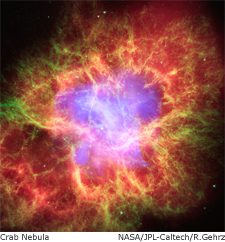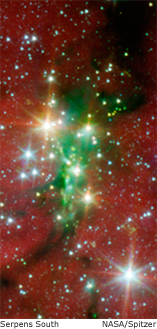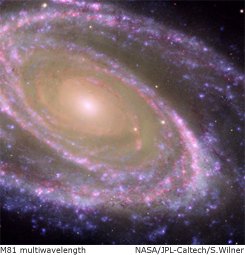
|
Syllabus Syllabus for printing - pdf ASTRONOMY 307 INTRODUCTORY ASTRONOMY
Main Course Website: COURSE DESCRIPTION: Astronomy 307 is a one-semester introductory survey course on modern astronomy, for science and engineering majors. We will assume that you are comfortable with solving problems and using math as a tool to help you master the course material. If this statement does not accurately describe you, you should consider switching to Astronomy 301, the introductory course intended for non-science majors. There are several sections of Ast 301 offered each semester. Astronomy is a very broad subject to cover in a single semester, so we will move through the material at a rather rapid pace. Our goal is to provide a comprehensive overview of the Universe from our Solar System to the largest scales. It's possible that we may not be able to cover your favorite topic in sufficient depth to fully satisfy your curiosity; in that case, you may wish to take one of the Astronomy Department's several follow-up courses on a variety of topics (Ast 309 series), in a future semester. TEXTBOOK: We will use the 8th edition of the textbook "Universe" by Roger Freedman and William Kaufmann.
It employs a bit more math than most other introductory texts, but also provides you with guidance and hints for
approaching numerical problems, including worked examples. You are strongly encouraged to buy this (latest) edition of the
book, since older editions may not contain all the same material and problems. (If you do buy an earlier edition, make sure
that it isn't an abridged version; these will be missing one of the major units.) The text is also available as an eBook, either
with the paper book, or purchased separately at a lower price. The auxiliary CD "Starry Night" is mainly included for fun
and for help in visualizing the material in the first unit, on the night sky. Other resources that are available on the
book's website,
include animations, interactive figures, practice problems & quizzes, and so on.
APPROXIMATE SCHEDULE OF TOPICS AND READINGS:
A more detailed and frequently updated schedule will be posted on the class website. 
COURSEWORK AND GRADING BASIS: Course grades will be based on individual performance, rather than graded on a curve (no "grade quotas"). You will be able to access your grades via eGradebook. Semester grades will be computed as follows: Hour Exams: 75%. There will be 3 in-class hour exams during the semester. The format will be announced later, but is likely to include fill-ins, short essays, and a few problems. Calculators should be brought to exams; we will provide the paper. *** Important: I do not give make-ups for missed hour exams. If you must miss an exam for any reason,
even a justified one, or are not satisfied with your grade on an exam, you must take the comprehensive final exam,
which serves as an all-purpose make-up. Alternatively, the final exam grade, which will cover material over the whole
semester, can replace a lower score on any earlier exam. You do not need to provide a documented excuse in
order to take advantage of the latter option. (However, missing two hour exams is a serious matter; such cases
will be considered on an individual basis and require very complete documentation to receive any further adjustments.)
Graded Homeworks: 15%. There will be roughly 7 or 8 graded problem sets during the semester.
We will drop one (or possibly two) lowest homework scores from the total HW grade. Generally you will have a week to complete them;
HW will not be due on exam days. While you may discuss the homework in a general way with classmates, and are encouraged
to seek help from the T.A. or instructor if you need it, the work that you turn in must be your own. See below for more
on academic integrity.
Class Participation and Extra Credit: 10%. The remaining 10% of your grade will be based on class participation, which includes regular attendance, cooperative behavior in class, and participation in the in-class activities (such as responses via index cards, which will be solicited roughly once per week). These can be supplemented by certain pre-approved outside activities, such as documented attendance at an Astronomy Department sponsored Star party, or at special relevant lectures that may occur during the semester. However, you cannot earn more than 10% of the course grade from the combination of class participation and extra credit. IMPORTANT DATES THIS SEMESTER (THESE APPLY TO ALL FALL 2008 CLASSES):
INSTRUCTOR POLICIES AND EXPECTATIONS: In order to get your money's worth and do well in this course, it is important that you attend regularly and keep up with the reading and coursework. We will be moving at a fairly rapid pace, and will do our best to keep the class website current, but it is your responsibility to stay informed.
Scholastic Integrity/Academic Dishonesty: The University of Texas at Austin has recently adopted an honor
code, but the code does not spell out expectations for student conduct in any detail. More detail and more useful information can be
found on the web pages of the Dean of Students, under Student Judicial Services:
http://deanofstudents.utexas.edu/sjs/index.php;
see especially the links called "The Standard of Academic Integrity" and "Scholastic Dishonesty." The College of Natural
Sciences takes these rules seriously. We will not tolerate copying or cheating on exams, homeworks, or other classwork.
If we find duplicated work or evidence for cheating, neither student will receive credit. We may also impose more severe
academic penalties, depending on the circumstances, not excluding an F for the course, or a report of academic
dishonesty to the Dean of Students.
GETTING HELP: The Instructor and T.A. will hold regular office hours several times a week. Please try to bring your questions to us at these times if possible, since we both have other responsibilities in addition to Ast 307 duties, and may not necessarily be available at other times of the week. However, if you cannot attend any of our regular office hours, please contact us and we will try to find an alternate appointment time. The T.A. will hold help sessions shortly before homeworks are due, and before hour exams. You can also contact us with questions by email. However, please check the class website first, to see whether the answer is already posted. We will be posting frequent announcements, updates, and other information there. (I do not encourage students to set up or participate in chat groups or the equivalent that discuss the homework. This has the potential of spreading misinformation; and giving answers to problems to other students will be considered scholastic dishonesty.) STUDENTS WITH DISABILITIES: Upon request, the University of Texas at Austin provides appropriate academic adjustments for qualified students with disabilities. Contact the Office of the Dean of Students at 471-6259, or (TTY) 471-4641, or via email to ssd@uts.cc.utexas.edu or see http://deanofstudents.utexas.edu/ssd/. SPECIAL EVENTS: The Astronomy Department offers evening Star Parties (viewing through small telescopes)
on campus. Star Parties will take place on certain Wednesdays, Fridays, and Saturdays; details will be announced and
posted at http://outreach.as.utexas.edu/public/viewing.html.
We anticipate that there will be one or more special "public" talks relevant to the content of Ast 307 at some point during the semester. Most likely these will be free lectures held on campus in the afternoon or evening. If you attend one of these in order to earn participation credit, you will be required to write up what you learned, in your own words, and your write-up will be evaluated to determine how many points will be earned. DEPARTMENTAL INFORMATION: If issues arise during the semester that cannot be resolved with the instructor or TA, you may contact the Chair of the Undergraduate Studies Committee, Prof. Gregory Shields (471-1402 or shields@astro.as.utexas.edu), or the Chairman of the Department of Astronomy, Prof. Neal Evans (471-3302, chairman@astro.as.utexas.edu). More information can be found in a separate document, "Memo to Undergraduate Astronomy Students," which is posted at http://outreach.as.utexas.edu/students/memo.html. SUBSTITUTE PROFESSORS: All Astronomy faculty, including your professor, are professional astronomers who
conduct research and sometimes need to travel in order to make observations ("field work") and attend conferences,
workshops, and other meetings. As luck would have it, your professor must make two trips early in the semester, including
the very first class meeting. However, the class will continue to meet regularly, and will be led by another Astronomy
professor, so you will be in good hands! As of the beginning of the semester, you can expect that the class meetings
of Aug. 27, Sep. 9, and Sep. 11 will be led by Professor Chris Sneden.
|
Astronomy Program · The University of Texas at Austin · Austin, Texas 78712
prospective student inquiries: studentinfo@astro.as.utexas.edu
site comments: www@www.as.utexas.edu
 Classroom Behavior: I expect you to be attentive in class, and to be respectful of your instructor and classmates.
The classroom is not the place for non-class-related social interactions or cell phone conversations. Please turn off the volume
on your cell phone before the beginning of class. First time violators will be merely grimaced at, but subsequent cell-phone
disruptions will adversely affect your participation grade. In addition, although some instructors allow students to use laptops
in class, it will not be allowed in Ast 307, as it is distracting to the instructor and fellow students.
Classroom Behavior: I expect you to be attentive in class, and to be respectful of your instructor and classmates.
The classroom is not the place for non-class-related social interactions or cell phone conversations. Please turn off the volume
on your cell phone before the beginning of class. First time violators will be merely grimaced at, but subsequent cell-phone
disruptions will adversely affect your participation grade. In addition, although some instructors allow students to use laptops
in class, it will not be allowed in Ast 307, as it is distracting to the instructor and fellow students.
 As you may have noted above, it is possible to earn a (small amount of) extra credit by attending one of these star parties; in
order to earn this credit you must get a signed slip from the person presiding over the star party. Warning to the naïve: Star
parties are held only when the weather permits! They are cancelled when it's too cloudy to see anything, so it is very dangerous
to procrastinate and assume that you can wait the end of the semester. If it's cloudy that evening, you will be disappointed - and out of luck!
As you may have noted above, it is possible to earn a (small amount of) extra credit by attending one of these star parties; in
order to earn this credit you must get a signed slip from the person presiding over the star party. Warning to the naïve: Star
parties are held only when the weather permits! They are cancelled when it's too cloudy to see anything, so it is very dangerous
to procrastinate and assume that you can wait the end of the semester. If it's cloudy that evening, you will be disappointed - and out of luck!